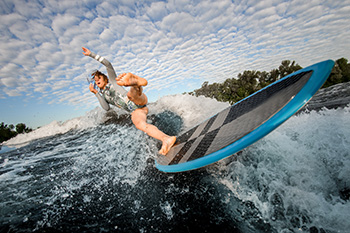
Ankle injuries are an ongoing concern among surfers, especially those who continually push their limits in pursuit of perfect waves and daring tricks. From simple ligament strains to complex fractures, the spectrum of ankle injuries in surfing can lead to extended periods out of the water. To safeguard against ankle injuries, experts emphasize the importance of prioritizing ankle strength and stability. Enhancing proprioception, the body's spatial awareness is paramount for injury prevention. Balance exercises on unstable surfaces are often used to simulate conditions encountered while surfing. Plyometrics, which focuses on explosive movements and controlled landings, can aid in developing ankle resilience. Using resistance bands during ankle exercises can help strengthen key muscles involved in ankle stability. Incorporating dorsiflexion, internal rotation, and external rotation exercises can fortify ankle joints against the stresses of wave-riding and reduce vulnerability to injury. If you have injured your ankle while surfing, it is suggested that you make an appointment with a podiatrist for an exam and treatment options.
Ankle and foot injuries are common among athletes and in many sports. They can be caused by several problems and may be potentially serious. If you are feeling pain or think you were injured in a sporting event or when exercising, consult with Mohammad R. Parsa, DPM from Madison Foot Clinic. our doctor will assess your condition and provide you with quality foot and ankle treatment.
Common Injuries
The most common injuries that occur in sporting activities include:
- Achilles Tendonitis
- Achilles Tendon Rupture
- Ankle Sprains
- Broken Foot
- Plantar Fasciitis
- Stress Fractures
- Turf Toe
Symptoms
Symptoms vary depending upon the injury and in some cases, there may be no symptoms at all. However, in most cases, some form of symptom is experienced. Pain, aching, burning, bruising, tenderness, tightness or stiffness, sensation loss, difficulty moving, and swelling are the most common symptoms.
Treatment
Just as symptoms vary depending upon the injury, so do treatment options. A common treatment method is known as the RICE method. This method involves rest, applying ice, compression and elevating the afflicted foot or ankle. If the injury appears to be more serious, surgery might be required, such as arthroscopic or reconstructive surgery. Lastly, rehabilitation or therapy might be needed to gain full functionality in the afflicted area. Any discomfort experienced by an athlete must be evaluated by a licensed, reputable medical professional.
If you have any questions, please feel free to contact our office located in Madison, MS . We offer the newest diagnostic and treatment technologies for all your foot care needs.
